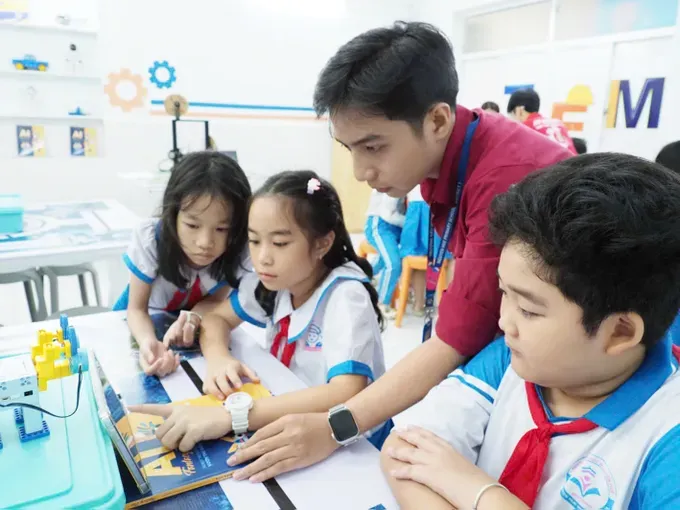
Step into a fifth-grade Vietnamese literature class at Dang Tran Con Primary School, and it’s a lovely sight that the room has been magically transformed into a garden. The air is filled with the chirping of birds and the gentle cooing of doves. This isn’t a field trip; it’s a lesson brought to life by AI.
Their teacher, Nguyen Truong Giang, explained that instead of simply having students read a descriptive passage from a textbook, he used AI tools to create an immersive video. Vivid sounds and moving images of flowers and birds allow the students to see with their own eyes and hear with their own ears, turning abstract descriptions into a tangible experience.
In another classroom at Nguyen Hue Primary School, a fourth-grade science lesson on food chains has taken an exciting turn. Students are tasked with using programming tools to create digital animations of the animals. “It’s the first time I’ve ever used a programming tool,” beamed Ta Bao Hien, a student. “Our whole team had to work together. The challenge made us even more determined to create a perfect animal.”
“Previously, our STEM classes involved materials like paper and glue,” noted Ta Le Nhat Vy, who runs the school’s bilingual STEM AI lab. “Now, with AI integration, students learn to program their creations. It develops their mathematical thinking and programming skills while making the lesson far more engaging and creative.”
“Many parents are still apprehensive about their children using AI. It’s our job as teachers to help them understand the positive benefits, and to coordinate with them to supervise learning at home. For the students themselves, it’s crucial that they are equipped with digital citizenship skills before they start, so they can master their learning and interact safely online.”
Teacher Ta Le Nhat Vy
For teachers like Nguyen Truong Giang, incorporating technology is no longer optional; it’s a mandatory requirement in the era of educational reform. To be effective, he suggests teachers must be proactive, engaging in self-study, joining online communities, and learning from their colleagues.
School leaders are devising strategies to foster this city-wide movement. Principal Pham Thuy Ha of Dang Tran Con Primary School suggests a “train-the-trainer” approach. “With limited funds, we can train a core group of young, tech-savvy teachers,” she explained. “These ‘seeds’ can then provide hands-on mentorship to their colleagues.”
For middle and high schools, over the past summer, many schools have organized training classes on using AI for all managers and teachers in the school.
Principal Nguyen Doan Trang of Tran Van On Junior High School (Ben Nghe Ward) believes that teachers need to quickly grasp changes in technology so that their lessons meet new teaching requirements. In addition to organizing teaching activities, technology platforms also help teachers improve the process of managing and assessing student competencies in a changing teaching context.
The city’s Department of Education and Training sees AI as a key to personalizing education. Ho Tan Minh, Office Chief of the department, stated that the department plans to use AI to analyze how students interact with online learning systems, which will allow for the tailoring of content to each student’s individual abilities and needs.
Head Lam Hong Lam Thuy of the General Education Division (HCMC Department of Education and Training) said: “In the 2025-2026 school year, HCMC will strongly apply IT, including the deep integration of AI and virtual/augmented reality (VR/AR) into the process of teaching and learning English on an online learning platform for students. This is one of the solutions to implement Conclusion No. 91-KL/TW (August 12, 2024) of the Politburo and Decision No. 1600/QD-TTg (December 19, 2024) of the Prime Minister, aiming to gradually make English a second language in schools.”
To solve the difficulties in teaching human resources, the education sector will focus on training and fostering to standardize the English proficiency of teachers while building preferential policies and support to attract good teachers and native teachers to work at schools, especially in difficult areas.
Regarding facilities, localities need to continue to encourage and create favorable conditions for the mobilization of social resources from businesses, organizations, and individuals to invest in modern facilities, equipment, and learning materials to support the teaching and learning process of teachers and students.
Concerns about children's early exposure to technology devices
Despite the enthusiasm, the initiative is not without its critics. On social media forums, many parents have voiced concerns about young children in preschool and primary school getting too much screen time. This demand has also led to a boom in private AI courses of wildly varying quality, leaving parents confused.
Officials are urging a measured approach. At a recent press conference, Director Ho Duc Thang of the National Institute of Digital Technology and Digital Transformation (Ministry of Science and Technology) argued that when introducing AI at the primary level, there must be clear goals and robust “ethical guardrails” to protect students.
“Instead of focusing on having young students use AI directly,” he suggested, “schools should first concentrate on empowering teachers to use AI to make their lessons more effective.”
Many teachers agree, adding that current training programs are often too broad and ineffective. They advocate for more targeted, practical professional development rather than mass, one-size-fits-all sessions. They also suggest that the city’s annual awards should place a greater emphasis on recognizing excellence in technology integration, thereby promoting best practices across the entire sector.
























